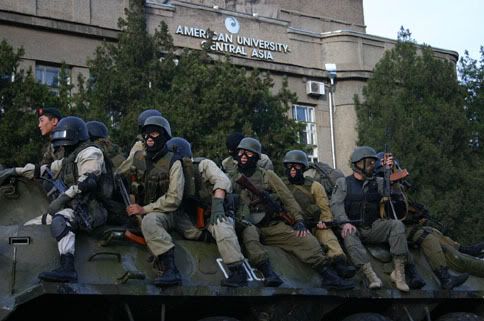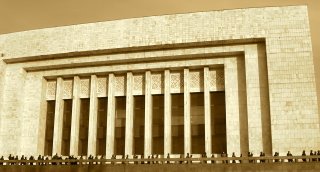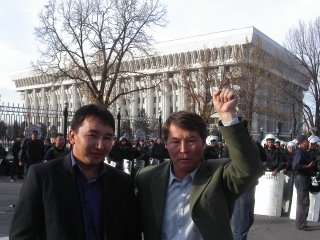
and there is nothing like standing 50 yards away from exploding concussion grenades to get your blood flowing.
See more photos here
Well, I was amazed it took this long for the tear gas and concussion grenades to come out. Five days of endless speeches, marches, taunts, threats, political maneuvering, defections, late night parliamentary sessions, and lots and lots of vodka. Demonstrations in front of the White House, where President Bakiev's administration works, in front of the parliament, up and down Chui Prospekt, in front of the state-run television station. For five days the city center has been in a kind of limbo. Normal life goes on uninterrupted just 3 blocks from Ala Too Square, but tensions remain high as the local citizens beseiged by these demonstrations hear rumor after rumor about 'real trouble' and another possible revolution. The big supermarkets and department stores close early, shops and restaurants board up their windows. Everyone fears the return of the gratuitous rioting that not only crippled the economy and decimated businesses in the city, many of which were owned by ousted President Askar Akayev's family, but also shocked many locals who couldn't believe that so many of their own neighbors would join the orgy of stealing.

Of course many feel it was just payback for Akayev's own decade long orgy of stealing the country's resources, including money paid by the Pentagon for the use of the Ganci air base during the war in Afghanistan. And now Bakiev has continued the post-soviet tradition of taking power and stuffing your pockets and those of your family/clan. His son took over the same businesses Akayev's son used to run, and when the public cried foul on Maxim Bakiev, his father just sent him to Latvia, where he supposedly sits on $25 million. That's a big allowance for his son. The cost of living in Riga must astronomical. In addition to his own corrupt ways, Bakiev has failed to really crack down on corruption in general, which has really spiraled out of control since he took power. Some regions of the country are run by a kind of private government, where a rich clan leader might run it like his own fiefdom. Some say that Bakiev really has little control over much of the country because its really just made up of regional fiefdoms, with heroin trafficking from Afghanistan providing a nice boost to the fiefdoms of the south. He has also failed to undertake any real governmental reforms he promised, and little has been done to tackle persistent poverty and unemployment throughout much of the country. Independent media has been harrassed and even shut down at times. After the 2005 Revolution, hopes were high that Kyrgyzstan would finally take serious steps to become a true democracy. The disappointment of people here is so thick it oozes, and it has frozen many people back into a pessimistic, fatalistic mindframe. But maybe these demonstrations have woken enough people up.

Certainly the teargas and concussion grenades were a wake up call. All along Bakiev said he was prepared to restore order with force. He was even quoted as saying he'd take up a sub machine gun himself if he had to. And as long as the Ministry of the Interior was on his side, showing their muscle by mobilizing riot police and special forces every day next to Ala Too square, the opposition movement had to make damn sure their tactics didn't provoke any violent reactions. To their credit, security forces have stood down most of the time, biding their time in the shade of the park, playing cards, smoking cigarettes, and apparently making a bit of a mess. A colleague of mine had to walk through to park to get to the university on Monday, and she said the stench was unbearable. It wasn't just horse shit either. And many of these military guys are just young recruits in mismatching uniforms and some in tennis shoes, they were not the rabid, steroid-pumped riot police used in the U.S. These Kyrgyz cadets didn't want trouble. On the first day of the demonstrations outside the parliament building, two little delinquents tossed a couple black cat firecrackers at some of the riot policemen, who happened to look like just teenagers themselves. The loud cracks shook everyone elses nerves at the time, but the policemen just remained calm and tried to ignore it. I couldn't believe how stoic these guys were. What would it take to provoke these guys?

Today we found out. I joined a large procession of several thousand opposition demonstrators walking from the White House down to the Parliament building, where a few hundred Bakiev supporters were waiting on the front steps, waving flags and shouting pro-Bakiev slogans behind the safety of the security services. After five days of relative peace, it was easy to tell that this show-down would significantly raise the stakes. As I entered the fray of people in front of the Parliament, the scene took on the feel of a warped kind of football pep rally between two rival high schools, seeing who could shout their cheers with the most spirit. "Ba-ki-ev! Ba-ki-ev!" "Bakiev Ketsin! (Bakiev get out!)" Spirit is an understatement in this case. It was just a matter of time before the hyped-up hooligans in each crowd stopped throwing middle fingers at each other and began to throw bottles, rocks and sticks. Without waiting for a full-scale melee, security services launched their grenades toward the direction of the opposition rock-throwers. BOOOM! BOOOM! BOOOM! Hundreds of riot police then gave chase with batons and shields toward the retreating opposition crowd as gas spewing cannisters arced into the air, right in front of the American University. My office! I think it's the first time I've watched a riot in front of my workplace. Well, at least its some kind of publicity for the university. "Come to the American University of Central Asia. On the front lines of democracy. Bring your gas mask." Fortunately, the sweep was short-lived and only a dozen or so were hurt as it unfolded. Prevailing winds also blew the tear gas the other way, and a tense order was restored.
 (Photo courtesy of kyrgyzreport.com)
(Photo courtesy of kyrgyzreport.com)Eyes were opened by this maneuver, and as a new human wall of security services began pushing toward the opposition side, opposition operatives quickly warned us to turn back to the square and avoid more confrontation. Slowly, methodically, the tide of police pushed the opposition all the way back to Ala-Too Square as Bakiev supporters back at the parliament congratulated themselves for standing down the enemy. Of course the opposition wasted no time taking their own stage at the south end of the square, where hundreds have been camping out since last Thursday nearly 100 red tents and a dozen yurts. The opposition rally began anew with greater urgency as the full security force sat on the edge of the square, awaiting their orders to clear Ala Too square once and for all. For a moment it felt like there would be a reprieve as the security forces stood down and began to relax on the north end of the square.

Just then a Kyrgyz man approached me and asked if I would interview him. I guess he assumed I was a journalist. He probably assumed that any westerner dumb enough to troll around there must be a journalist. His name was Almaz, and he was visibly shaken by the whole confrontation half an hour earlier. He said he's a lawyer, but could only find work as a translator. He was extremely disappointed with Bakiev and said he was ready to "shed my own blood" to help bring real democracy to Kyrgyzstan. He said his friends in Naryn, Issyk Kul, and Chui Oblasts were all ready to do the same. And if the rest of the country knew what was going on in Bishkek, he's sure they would all come to help get rid of Bakiev. Unfortunately, most of the country only has access to the state television channel, which constantly airs pro-Bakiev programming and news. Even the independent Russian channel NTS, which only can be watched around Bishkek, was taken off the air after a mysterious fire. Almaz didn't want it to come to bloodshed, but he was certain that if Bakiev was allowed to protect the vast powers of the presidency, the next president to come along would surely be a worse kind of dictator, along the lines of Karimov in Uzbekistan. He really felt like this was the time for change. It would not come fast, but it would take time and sacrifice. He drew upon the example of Martin Luther King and the civil rights movement in the fifties and sixties. That struggle took years, with many hardships endured, but they prevailed because they never lost sight of the prize. Almaz then spoke of his own struggle as a converted Christian in a Muslim country. In his home province of Naryn, some militant muslims began harrassing him and fellow parishoners in the church he founded there. The harrassment and threats, from neighbors and even some family members, became too much and he had to move to Bishkek.

His religion clearly kept him grounded, especially when thinking about the struggle of creating democracy in Kyrgyzstan. He admitted that neither side were ideal, scoundrels and good people existed in both camps. One dubious factor in the opposition demonstrations has been the widely known practice of paying villagers to come into the city and join the protests. I've heard several times that families were given 500 soms ($12.50), and young men who normally work in the fields were offered a daily wage up to a dollar more than their usual wages to come camp out in the square. Almaz also said a friend of his was asked by a Bakiev supporter earlier in the day to join the pro-Bakiev rally in front of the parliament building and make a ten minute speech extoling the virtues of the president. And if he agreed, he would get 200 soms ($5.00). Almaz shook his head and said, "look, I have steady work translating, I make decent money. I can feed myself and I can afford to come out here on my own. A lot of people simply need to find a way to eat. 200 soms is a lot for these guys. I'd do it if I was in his shoes." I asked if his friend took the offer, and he said yes. But despite all these pay-offs and shady resumes of politicians on both sides, he believes there are enough people on the opposition side who truly want democracy for this country that he's willing to risk it all to join the fight. "I saw on the news this year a pro-democracy activist from one of the Caucausus countries saying that he wants his country to have a revolution like the Kyrgyz," Almaz remarked. "It made me feel really proud to hear that. You know, we can be one of the only real democracies in the former Soviet Union." As darkness began to fall I felt it was time to leave. It was going to be a long, possibly violent night, and it was their fight. It was reported that a thousand Bakiev supporters were coming up to Bishkek from Bakiev's home oblast of Jalalabad, which would certainly add to the threat of violence, especially as the empty vodka bottles piled up. I promised to call Almaz the next day to see if he was ok.





